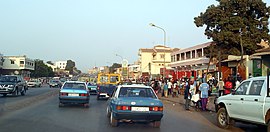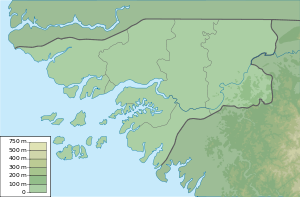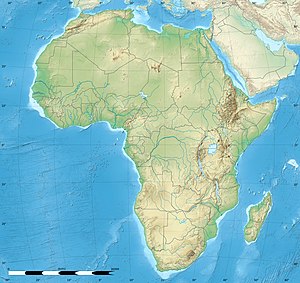Bissau
show This article may be expanded with text translated from the corresponding article in Portuguese. (March 2021) Click [show] for important translation instructions. |
Bissau | |
|---|---|
           Photos of Bissau | |
 Flag  Coat of arms | |
 Bissau Location of Bissau in Guinea-Bissau | |
| Coordinates: 11°51′N 15°34′W / 11.850°N 15.567°WCoordinates: 11°51′N 15°34′W / 11.850°N 15.567°W | |
| Country | Guinea-Bissau |
| Region | Bissau Autonomous Sector |
| Founded | 1687 |
| Area | |
| • Total | 77.5 km2 (29.9 sq mi) |
| Elevation | 0 m (0 ft) |
| Population (2015 census) | |
| • Total | 492,004 |
| • Density | 5,009/km2 (12,974/sq mi) |
| Time zone | UTC+0 (GMT) |
| ISO 3166 code | GW-BS |
| Climate | Aw |
Bissau (Portuguese pronunciation: [βiˈsaw]) is the capital city of Guinea-Bissau. In 2015, Bissau had a population of 492,004.[1] Bissau is located on the Geba River estuary, off the Atlantic Ocean, and is Guinea-Bissau's largest city, major port, and its administrative and military centre.
Etymology[]
The term Bissau comes from the name Itchassu (later N'nssassu and Bôssassum), which means "brave as the jaguar", possibly in reference to the warrior profile of the inhabitants of the island of Bissau, mimicking the African leopard,[2] a great feline predator, known in the country as "jaguar".[3] Over time Bôssassum started to be written as Bisão (or "São José de Bisão"), Bissao and finally "Bissau".[2]
Bôssassu (or Itchassu) was the name given to the nephew of King Mecca - the first sovereign of the island of Bissau -, son of his sister Pungenhum. Bôssassu formed the main clan of the paper peoples and the Kingdom of Bissau, the main of the pre-colonial states on the island of Bissau. The bassassum were the kings and noblemen (djagras) of the Kingdom of Bissau.[4]
History[]
This section needs expansion. You can help by . (October 2020) |
The city was founded in 1687 by Portugal as a fortified port and trading center.[5] In 1942 the capital of Portuguese Guinea was transferred from Bolama to Bissau.
After the declaration of independence by the anti-colonial guerrillas of PAIGC in 1973, the capital of the rebel territories was declared to be Madina do Boe, while Bissau remained the colonial capital. When Portugal granted independence, following the military coup of April 25 in Lisbon, Bissau became the capital of the new independent state.
Bissau was the scene of intense fighting during the beginning and end of the Guinea-Bissau Civil War in 1998 and 1999.[6]
Geography and climate[]

Bissau is located at 11°52' North, 15°36' West (11.86667, -15.60) GNS: Country Files, on the Geba River estuary, off the Atlantic Ocean. The land surrounding Bissau is extremely low-lying, and the river is accessible to ocean-going vessels despite its modest discharge for about 80 kilometres (50 mi) beyond the city.
Bissau has a tropical savanna climate (Köppen Aw), not quite wet enough to qualify as a tropical monsoon climate (Am) but much wetter than most climates of its type.
Almost no rain falls from November to May, but during the remaining five months of the year the city receives around 2,000 millimetres (79 in) of rain.
| hideClimate data for Bissau, Guinea-Bissau (1974-1994) | |||||||||||||
|---|---|---|---|---|---|---|---|---|---|---|---|---|---|
| Month | Jan | Feb | Mar | Apr | May | Jun | Jul | Aug | Sep | Oct | Nov | Dec | Year |
| Record high °C (°F) | 36.7 (98.1) |
38.3 (100.9) |
38.9 (102.0) |
41.1 (106.0) |
39.4 (102.9) |
35.6 (96.1) |
33.3 (91.9) |
32.8 (91.0) |
33.9 (93.0) |
34.4 (93.9) |
35.0 (95.0) |
35.6 (96.1) |
41.1 (106.0) |
| Average high °C (°F) | 31.1 (88.0) |
32.8 (91.0) |
33.9 (93.0) |
33.3 (91.9) |
32.8 (91.0) |
31.1 (88.0) |
29.4 (84.9) |
30.0 (86.0) |
30.0 (86.0) |
31.1 (88.0) |
31.7 (89.1) |
30.6 (87.1) |
31.5 (88.7) |
| Daily mean °C (°F) | 24.4 (75.9) |
25.6 (78.1) |
26.6 (79.9) |
27.0 (80.6) |
27.5 (81.5) |
26.9 (80.4) |
26.1 (79.0) |
26.4 (79.5) |
26.4 (79.5) |
27.0 (80.6) |
26.9 (80.4) |
24.8 (76.6) |
26.3 (79.3) |
| Average low °C (°F) | 17.8 (64.0) |
18.3 (64.9) |
19.4 (66.9) |
20.6 (69.1) |
22.2 (72.0) |
22.8 (73.0) |
22.8 (73.0) |
22.8 (73.0) |
22.8 (73.0) |
22.8 (73.0) |
22.2 (72.0) |
18.9 (66.0) |
21.1 (70.0) |
| Record low °C (°F) | 12.2 (54.0) |
13.3 (55.9) |
15.6 (60.1) |
16.7 (62.1) |
17.2 (63.0) |
19.4 (66.9) |
19.4 (66.9) |
19.4 (66.9) |
19.4 (66.9) |
20.0 (68.0) |
15.0 (59.0) |
12.8 (55.0) |
12.2 (54.0) |
| Average rainfall mm (inches) | 0.5 (0.02) |
0.8 (0.03) |
0.5 (0.02) |
0.8 (0.03) |
17.3 (0.68) |
174.8 (6.88) |
472.5 (18.60) |
682.5 (26.87) |
434.9 (17.12) |
194.8 (7.67) |
41.4 (1.63) |
2.0 (0.08) |
2,022.8 (79.63) |
| Mean monthly sunshine hours | 248 | 226 | 279 | 270 | 248 | 210 | 186 | 155 | 180 | 217 | 240 | 248 | 2,707 |
| Source 1: Sistema de Clasificación Bioclimática Mundial[7] | |||||||||||||
| Source 2: World Climate Guides (sunshine only)[8] | |||||||||||||
Demographics[]
At the 1979 census, Bissau had a population of 109,214. By the 2015 census Bissau had a population of 492,004.[1]
Economy[]
Bissau is the country's largest city, major port, educational, administrative, industrial and military center. Peanuts, hardwoods, copra, palm oil, milk products, and rubber are the chief products. Bissau is also the main city of the fishing and agricultural industry in the country.[9]
Transportation[]
Air[]
The airport that serves Bissau is Osvaldo Vieira International Airport, the only international airport in the country, with domestic and international flights to major cities in Africa as well as Europe, on six scheduled commercial airline companies.
Highways[]
The main highway connecting Bissau to the rest of the nation and the continent is the Trans–West African Coastal Highway. There are also many smaller national highways that connect to other big cities such as Bafatá and Gabu.
Education[]
The main secondary school institutions in Bissau are the National Lyceum Kwame N'Krumah[10] and the Bethel-Bissau Adventist School.[11] The main higher education institutions in the city are the Amílcar Cabral University,[12] the , and the .
The city of Bissau still has two international schools:[13]
- Escola Portuguesa da Guiné-Bissau
- Escola Portuguesa Passo a Passo
Culture[]
Attractions include the Portuguese-built Fortaleza de São José da Amura barracks from the 18th century, containing Amílcar Cabral's mausoleum, the Pidjiguiti Memorial to the dockers killed in the Bissau Dockers' Strike on August 3, 1959, the Guinea-Bissau National Arts Institute, Bissau New Stadium and local beaches.
Many buildings in the city were ruined during the Guinea-Bissau Civil War (1998–1999), including the Guinea-Bissau Presidential Palace and the Bissau French Cultural Centre (now rebuilt), and the city centre is still underdeveloped. Because of the large populations of Muslims in Bissau, Ramadan is also an important celebration.[14][15]
Sports[]
Football is the most popular sport in the country, as well as in the city. Many teams are based in the city, such as: UD Internacional, SC de Bissau, SC Portos de Bissau, Sport Bissau e Benfica, and FC Cuntum. Stadiums that are located in the city are Estádio Lino Correia and Estádio 24 de Setembro.
Religion[]
The majority of the population of Bissau is with the majority being Muslims (50%), then Christians (34%) and animists (7.9%).[16]
Places of Worship[]
Among the places of worship, they are predominantly Muslim mosques.[17] There are also some Christian churches and temples such as the Roman Catholic Diocese of Bissau (Catholic Church), Evangelical Churches, and the Universal Church of the Kingdom of God.

Mosque in Bissau
Gallery[]

View of Bissau from Geba River

Ministério da Justiça - Guinea-Bissau's Justice Ministry

Che Guevara Square, Bissau
Public transport in Bissau

A landmark monument in the city center

Administration building of the Portuguese energy company Galp

An ECOWAS branch in Bissau

PAIGC's headquarters

Residential area in Bissau

Guinea-Bissau's Presidential Palace

French Culture Centre in Bissau

Solar panels on a rooftop of a building

Central Post Office building

Museu Etnográfico Nacional - National Ethnographic Museum

Combatentes da Liberdade Avenue, Bissau

Bissau-Guinean Customs Agency, Porto de Bissau

One of the hotels in the city
International relations[]
Twin towns – Sister cities[]
Bissau is twinned with:
- Águeda Municipality, Portugal
- Dakar, Senegal
- Chongqing, People's Republic of China
- Agadir, Morocco
- Havana, Cuba
- Lisbon, Portugal
- Lagos, Nigeria
- Luanda, Angola
- Taipei, Taiwan[18]
- Praia, Cape Verde
- Ankara, Turkey[19]
- Sintra, Portugal
References[]
- ^ Jump up to: a b "Africa by Country Internet User Stats and 2017 Population". internetworldstats.com. Archived from the original on 2019-08-04. Retrieved 2017-11-01.
- ^ Jump up to: a b "Revoltas e resistências dos Papéis da Guiné-Bissau contra o Colonialismo Português - 1886-1915. (Trabalho de Conclusão de Curso de Bacharelado em Humanidades)" (PDF).
- ^ "Quadro Nacional da Biotecnologia e da Biossegurança da Guiné-Bissau" (PDF).
- ^ "O casamento tradicional na Guiné-Bissau" (PDF). Archived from the original (PDF) on 2020-07-12. Retrieved 2021-04-19.
- ^ Cybriwsky, Roman Adrian (2013). Capital Cities Around the World: An Encyclopedia of Geography, History, and Culture. ABC-CLIO. p. 53.
- ^ "Guinea-Bissau". Uppsala Conflict Data Program Conflict Encyclopedia. Uppsala University. Archived from the original on 2013-12-31. Retrieved July 12, 2013.
- ^ "GUINEA-BISSAU - BISSAU". Centro de Investigaciones Fitosociológicas. Archived from the original on 2007-08-07. Retrieved 2011-10-04.
- ^ "Bissau Climate Guide". Centro de Investigaciones Fitosociológicas. Archived from the original on 2007-08-07. Retrieved 2011-10-04.
- ^ Urbanização na Guiné-Bissau: Morfologia e Estrutura Urbana da sua Capital [Urbanization in Guinea-Bissau: Morphology and Urban Structure of its Capital] (Master's thesis) (in Portuguese). Lisbon University of Humanities and Technologies. 2010. pp. 93–97. Archived from the original on 6 January 2021. Retrieved 16 October 2020.CS1 maint: date and year (link)
- ^ Furtado, Alexandre Brito Ribeiro (2005). Administração e Gestão da Educação na Guiné-Bissau: Incoerências e Descontinuidades [Administration and Management of Education in Guinea-Bissau: Inconsistencies and Discontinuities] (Doctorate thesis) (in Portuguese). Universidade de Aveiro. hdl:10773/1098.
- ^ "Voluntários Fazem Diferença em Projeto em Guiné-Bissau" [Volunteers Make a Difference in a Project in Guinea-Bissau]. Notícias Adventistas (in Portuguese). 22 July 2016. Archived from the original on 2021-01-06.
- ^ "Equipamento Novo e Desafios Adicionais para Universidade Amílcar Cabral" [New Equipment and Additional Challenges for Universidade Amílcar Cabral]. Rádio das Nações Unidas (in Portuguese). 19 May 2015. Archived from the original on 2015-05-29. Retrieved 29 May 2015.
- ^ "Escolas com Currículo Português na Guiné-Bissau" [Portuguese Curriculum Schools in Guinea-Bissau]. Direção de Serviços de Ensino e Escolas Portuguesas no Estrangeiro (DSEEPE) of the Portuguese Education Ministry (in Portuguese). Archived from the original on 2015-05-31. Retrieved October 26, 2015.
- ^ "Korité in Guinea-Bissau in 2021". Office Holidays. Retrieved 2020-10-17.
- ^ "Guinea-Bissau Holidays and Festivals". iexplore.com. Archived from the original on 2021-01-06. Retrieved 2020-10-17.
- ^ "Guinea-Bissau: socio-cultural characteristics" (PDF). National Statistics Institute. Archived from the original (PDF) on 2017-11-05. Retrieved 2020-10-17.
- ^ "Guinea-Bissau | History - Geography". Encyclopedia Britannica. Archived from the original on 2015-04-19. Retrieved 2020-10-17.
- ^ "Archived copy". Archived from the original on 2016-10-23. Retrieved 2017-11-20.CS1 maint: archived copy as title (link)
- ^ "Sister Cities of Ankara". www.ankara.bel.tr. Archived from the original on 2018-12-24. Retrieved 2016-08-11.
Further reading[]
- Lobban, Richard Andrew, Jr.; Mendy, Peter Karibe (1997). Historical Dictionary of the Republic of Guinea-Bissau (3rd ed.). Scarecrow Press. pp. 91–96. ISBN 0-8108-3226-7.
External links[]
- Bissau
- Populated places established in 1687
- Former Portuguese colonies
- Capitals in Africa
- Populated places in Guinea-Bissau
- Populated coastal places in Guinea-Bissau
- Geba River
- Regions of Guinea-Bissau
- Sectors of Guinea-Bissau
- 1687 establishments in Portuguese Guinea
- 1687 establishments in Africa





















